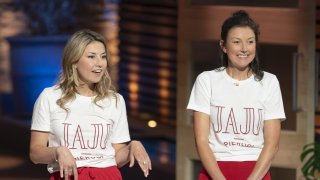
Business owners usually want potential investors to love their products. On Friday's episode of ABC's "Shark Tank," an investor did indeed fall in love with a product — and it kept him from offering a deal.
Sisters and co-owners Casey and Vanessa White went on the show to pitch their company, Jaju Pierogi, which sells pre-boiled, flash-frozen Polish dumplings in a variety of flavors. They launched their business in 2016 after dusting off their grandfather's handwritten recipe book from 1960 and "tinkering around" with the recipes, Casey said.
Stream San Diego News for free, 24/7, wherever you are with NBC 7.
The sisters asked the show's investor judges for $300,000, in exchange for an 8% equity stake in their business. The judges tasted the pierogis, and Cuban proclaimed himself a fan. "I grew up on pierogi. ... One of the beauties of pierogi is it's greasy and gooey," he said. "This loaded baked potato [flavor] is greasy and gooey."
Cuban's inability to stop eating the pierogi kept him from making an offer, he said: The 66-year-old generally tries to live a healthier lifestyle now than he did in his youth.
Get top local San Diego stories delivered to you every morning with our News Headlines newsletter.
"This is a great product. I love them," he said. "I ate too many of them, that's part of the problem. I'd balloon to 600 pounds — I have no willpower when it comes to stuff like this, and I'd rather be a customer than an owner."

The White sisters initially bought 40 boxes of their pierogi to test at a market and sold out within an hour, Casey said. At the time of filming, their products were in more than 2,500 grocery stores including Whole Foods, Sprouts and Harris Teeter, and their company was projected to finish the year with $2.7 million in annual sales, they said.
Money Report
However, the company wasn't profitable. "Last year, we lost $100,000," said Casey. "We would have been profitable, but we didn't negotiate for our contract with a large grocery chain like we should have ... I knew [in the] middle of last year that we were going to run out of cash, so that was the first time we had to raise money."
A slim profit margin per item sold didn't help, the investors observed. Each bag of pierogis cost $3.89 to make, $6.33 to distribute and sell for around $10, said the sisters.
"You don't have a lot of wiggle room," Cuban said. "You need to knock off 35% of your manufacturing costs," O'Leary added.
Lori Greiner declined to make an offer, saying she wasn't the right fit for the product. Daniel Lubetzky said he'd already invested in a company called Toast-It, which sells frozen arepas and is also owned by a sister duo, and he considered Jaju Pierogi to be too much of a competitor.
Robert Herjavec said he loved the pierogi samples, but didn't want to make an offer without Lubetzky, who has ample experience in the food industry.
O'Leary offered the sisters $300,000 for a 20% equity stake, but only if Jaju agreed to join forces with his manufacturing company, which he said helped give him "vertical strength" with another dumpling company in his investment portfolio.
Casey and Vanessa countered with $300,000 for 10%. O'Leary rejected the counteroffer, and the sisters walked away without making a deal.
"Maybe one of the Sharks will call us back one day and regret not making that deal," Vanessa said.
Want a new career that's higher-paying, more flexible or fulfilling? Take CNBC's new online course How to Change Careers and Be Happier at Work. Expert instructors will teach you strategies to network successfully, revamp your resume and confidently transition into your dream career. Start today and use coupon code EARLYBIRD for an introductory discount of 30% off $67 (+taxes and fees) through May 13, 2025.
Plus, sign up for CNBC Make It's newsletter to get tips and tricks for success at work, with money and in life.






